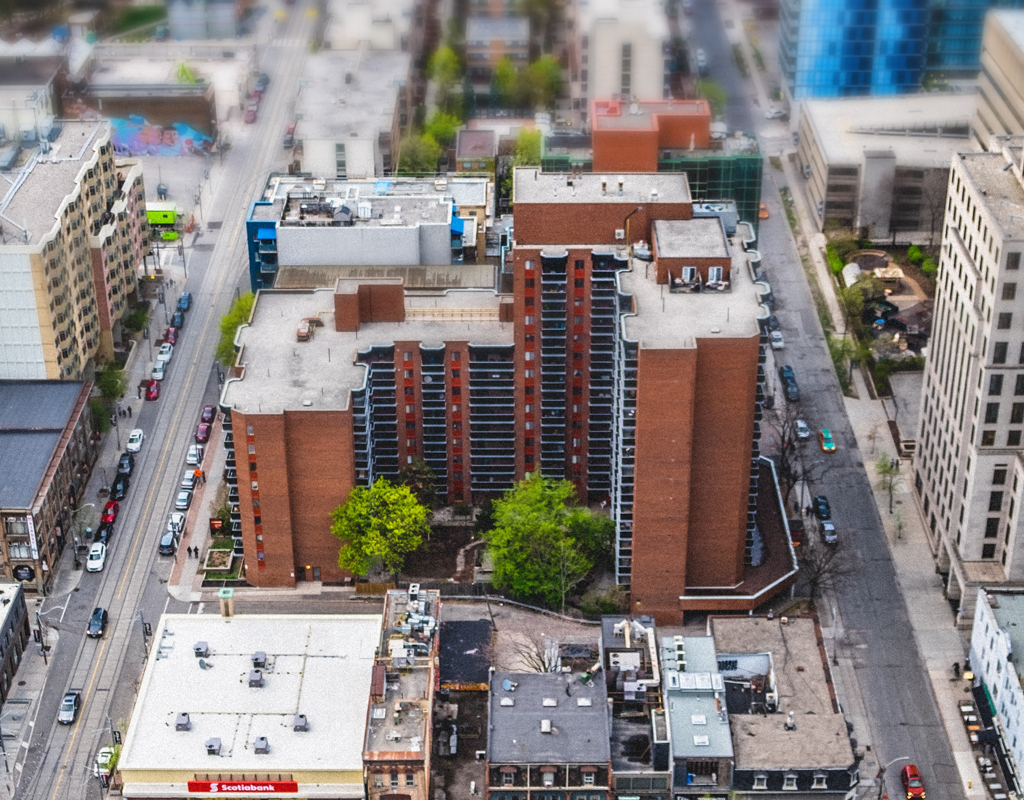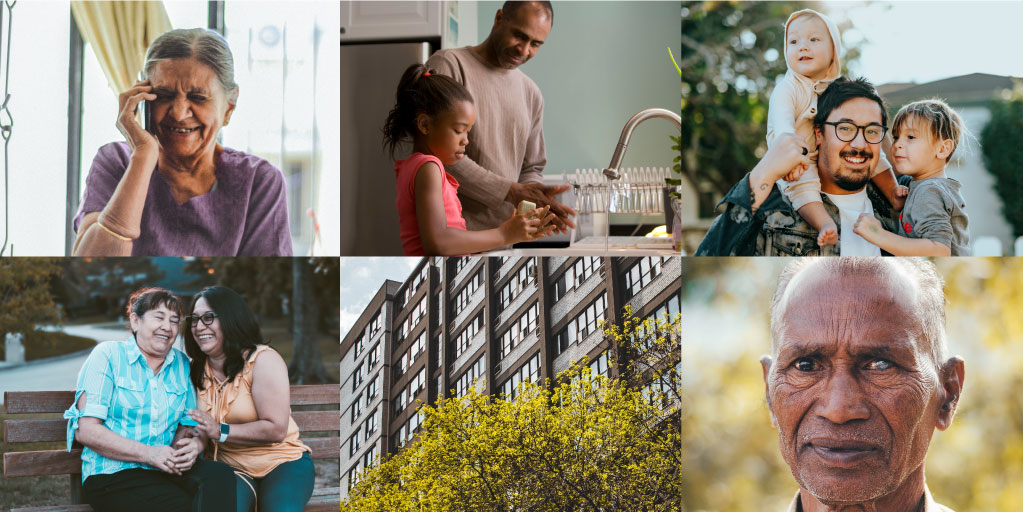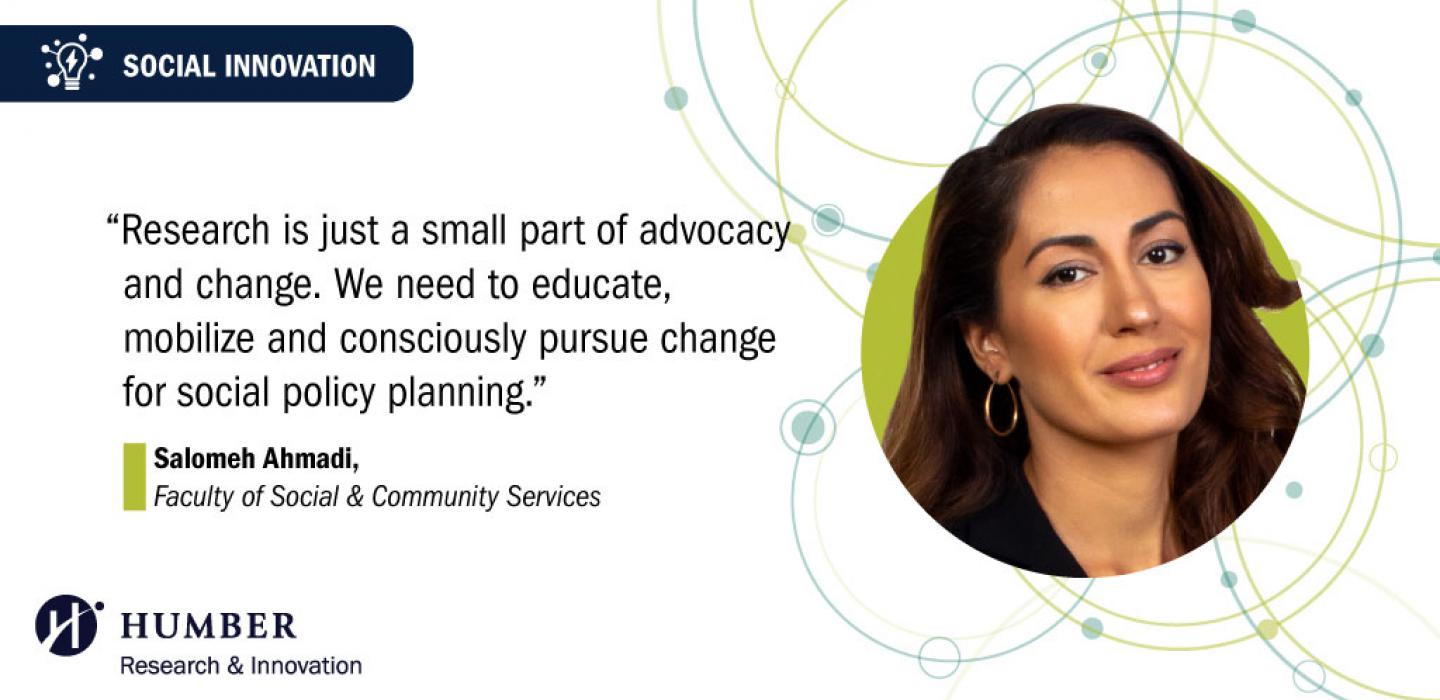Leading a research study focused on improving the health and wellbeing of the most marginalized in South Etobicoke, specifically low-income, seniors and students who face housing affordability issues.
We met with Professor Salomeh Ahmadi, Faculty of Social and Community Services, Humber College. Salomeh is a passionate researcher and has demonstrated leadership in program evaluation, youth mentoring, engagement & empowerment, conflict resolution, community development, grassroots organizing, human rights and social justice.
In 2020, four applied research projects led by professors in the Faculty of Social and Community Services received over $1.2 million in funding obtained through grants from the Natural Sciences and Engineering Research Council (NSERC). Salomeh Ahmadi is leading the research project “Affordable Housing Needs in South Etobicoke” as Principal Investigator, through the College and Community Social Innovation Fund (CCSIF) grant, in partnership with local community organizations—this project was awarded $360K.
Follow along through our Q&A session with Salomeh:
Humber’s Office of Research & Innovation (ORI): Could you provide us with a brief synopsis?
Salomeh Ahmadi (SA): Sky-high rent, condo developments, no rent control, evictions, and unstable housing are all issues standing in the way of affordable housing in South Etobicoke, Toronto, and major urban cities across the globe. The increase in cost of living coupled with a rise in rent and stagnant wages poses threats to those facing poverty, health challenges, or more disfranchised populations such as students and seniors. What are the cost of living issues for low-income and working-class citizens, and how can a Community of Practice be created to sustain advocacy efforts to support new models for affordable housing through social policy change?
ORI: Collaboration with local community organizations.
SA: Our main partner is LAMP Community Health Centre (LAMP CHC) along with Lakeshore Affordable Housing Advocacy and Action Group (LAHAAG).
ORI: What is the course of action adopted for this study?
SA: This is a three-phase project—currently in phase two: data collection. We are conducting a community based participatory research (CBPR) approach to:
- Develop a current baseline of housing affordability in South Etobicoke through primary and secondary research.
- Assess the impact of neighbourhood change and housing affordability and the displacement of tenants and marginalization as a compounding factor.
- Identify proactive measures to preserve affordable housing, protect affordability, improve the housing of tenants and advance social policy changes.
To ensure that the project is meeting the community’s needs, building relationships with locals and agencies, and ensuring the deliverables, I will be coordinating and working closely with Jasmin Dooh, Health Promoter, LAMP CHC, who has over 40 years of community development, advocacy, and partnership experience and expertise in outreach and community engagement. People with lived experience will participate and contribute by guiding the design and execution of the research journey from end-to-end.

ORI: Different phases of the research?
SA: In Phase One, we engaged with local citizens and agencies, hosted some community workshops, forums, and events. We acquired the research ethics approval, recruited outreach workers and research assistants through Humber. Engagement meetings with local agencies were crucial to identifying and solidifying trusted community champions for housing advocacy who serve clients facing challenges. We identified and built on strengths to develop, train, and design a Community of Practice (CoP) and CBPR approach to ensure authentic community building.
We developed the South Etobicoke Housing Affordability (SEHA) website to coordinate our efforts and disseminate shareable knowledge. In addition, we conducted an environmental scan of housing affordability, strategies and identified gaps.
During Phase Two, we are focusing on data collection, community mobilizing, and how to apply knowledge to specific problems, reviewing case studies, such as other Toronto-based housing advocacy groups. We just created an Advisory Group, which includes the voices of people from the community we intend to inform and assist in helping to mobilize and empower the community as collaborative partners.
“We are adopting the attitude of being researchers with our partners and the community; not just researching their cause for them.”
We are collecting data through surveys and questionnaires to discover cost of living and affordability issues, and a narrative approach will follow interviews and focus groups. Preliminary data and research gathered will include demographic, housing challenges and solutions, and socio-economic characteristics, movement in and out of the community, and subsidized housing units. At this stage, a crucial element for our team is to raise awareness and mobilize on affordable housing as a human rights issue, as there currently are policy pieces at the table municipally and federally.
In Phase Three, we will consolidate the data collected, organize quantitative and qualitative interpretation of responses into themes to disseminate the findings to a larger community, stakeholders and research partners for review and address policy change.
“Research is just a small part of advocacy and change. We need to educate, mobilize and consciously pursue change for social policy planning.”
We will conduct community workshops on housing rights, evictions, human rights and engaging politically, which will be provided through LAMP CHC and Centre for Equality Rights in Accommodation (CERA Ontario). We want to showcase and build momentum, have people recognize our work, and invite guest speakers to reflect, reimagine, and problem solve on the housing crisis. We will publish our findings in a journal and disseminate the knowledge, reporting it back to the community to use that data.

ORI: “Raison d’etre” for undertaking this project?
SA: The City of Toronto and South Etobicoke are in the midst of an affordable housing crisis. Income inequality, an increase in seniors’ population, rapid condo development, and a lack of rent price moderation are elevating the housing crisis. In addition, there is no cap on exceeding the average market rent, inadequate appeal processes for evictions and notices, and an improper or even lack of a definition of affordable housing.
I have volunteered and worked with LAMP CHC earlier, and I grew up in South Etobicoke. Honestly, it was the right time, I was at the right place at Humber, and I was prompted to apply for this grant to pursue and contribute to community-based social change. Thanks to the support from Humber’s Office of Research & Innovation (ORI), I wrote and received the federal NSERC grant.
There are several tools we could be adopting to affect change. First, let’s look at inclusionary zoning; many major cities around the world adopt this approach. The issue raised is– who would cover the cost of inclusionary zoning, partly covered by developers and partly subsidized by the city or federal level? Currently, the city council is mobilizing around inclusionary zoning, and we hope to contribute to the knowledge and research data to support it. It is especially relevant in the case of South Etobicoke; over 25,000 new units are being proposed (see City of Toronto’s Meetings, Agendas and Minutes webpage and search each project site), which indicates that this area is rapidly increasing in population without much regulation. We could look at something similar to Section 37 as adopted in the Kensington area in Downtown Toronto—it is a contract/agreement between the developer and the city with input from the community, focusing on affordable housing, as well as negotiating other social procurement such as local jobs, modular homes, green space, etc. basically an inclusive approaching to housing.
To better understand the solutions for affordable housing from an equity lens, we must first understand the local community’s needs. Look at some of the facts stated here:
- In only 3 percent of Canadian neighbourhoods, an individual earning minimum wage, working full-time hours, can afford to rent an average two-bedroom apartment (Macdonald, 2019). Yet, rent is on the rise in Toronto (Kalinowski, 2019).
- For the rental wages in Toronto, you have to earn $34 per hour to afford the current market rates of an averaged priced 2-bedroom apartment or work 98 hours per week at minimum wage (Macdonald, 2019).
How can we improve the neighbourhood environment, infrastructure and maintain sustainable and healthy communities? How can we have clarity and agreement about community needs and wants? These are the motivating factors driving this research.
ORI: Involvement of Research Assistants.
SA: Currently, we have two student research assistants on our team and two outreach workers. Learning outcomes for students will be significant; they will be able to:
- bridge the gap between classroom theory and practice by applying skills of community development, and CBPR
- support interviews and focus groups, facilitate surveys and gather information, attend meetings
- build capacity for change, co-lead projects and advocate for people who face barriers to living a full and healthy life
- help analyze social structure that marginalized people face by race, class, ability, and income
- apply an asset-based approach, analyze community strengths and resources from an empowerment perspective, analyze root causes of issues, and help discuss and co-facilitate appropriate strategies for change with the community.
“Problem-solving, critical thinking, and creativity, these are the skills needed for the next generation. We are not going to be able to get far ahead without these skills.”
“It is important to me to encourage my students to look at data from a wider lens and continuously question the status quo; what is this research data indicating, what is it not, is it outdated, is it biased, are there gaps, does this matter to a larger audience, how can this affect social policy, can this data support my hypothesis?”

Background and Expertise
Salomeh Ahmadi attained a Bachelor’s in Health Science (Honours) from The University of Western Ontario in 2010 and an MBA from Cape Breton University in 2019. She also acquired the Project Management Certificate from Seneca College in 2015 and completed the Teaching Effectiveness certification from Humber College in 2016.
She is a Professor in the Faculty of Social and Community Services Program at Humber since 2019, teaching courses on Issues in Diversity and First Nations; Diversity Issues; Cross Cultural Skills; Community Development. As well, Salomeh is a Professor in the Child & Youth Care Program at Sheridan College since 2017. Salomeh has over 11 years of evaluation background, including program evaluation and statistics, and 15 years of working in community settings. She contributed as a coordinator with Pathways to Education Canada, where she recruited, interviewed, and trained placement students for six years–about 5-13 successful post-secondary students in a given year were placed to work with high school students and their support workers.
As a consultant, she is passionate about radical change, authentic collaborations and connecting with creative thinkers focusing on strategic processes, community economic development through work with equity-seeking groups, and the interrelations across community, justice and socio-economics. She is also the founder of Rexdale Lab, a grassroots community group, previous Board Member with Lakeshore Arts, awarded the AFP Inclusion and Philanthropy Fellowship, and Captain of the varsity fencing team at Western. Salomeh has presented at many conferences and has conducted several workshops and seminars over the years.
On Research
Salomeh’s involvement with research began as a Research Assistant in 2008 while at Western, gathering both quantitative and qualitative data on CIHR funded research with Dr. Abraham Rudnick, and a knowledge management research project with Dr. Shannon Sibbald, respectively.
From 2012-2018, Salomeh was involved as a researcher on an annual participatory-based research project with youth in Rexdale. 2018-2019 Salomeh played the role of Researcher and Coordinator on an internal research project for LIFT Philanthropy Partners, funded by Immigration Refugees and Citizenship Canada. The research team launched Better Beginnings, Bigger Impact to help ten immigrant-serving organizations across Canada expand their capacity and reach to deliver meaningful change in the lives of newcomers. In 2019, as part of her MBA Research Paper, Salomeh was a lead researcher on a primary research project focused on ‘Artists as Entrepreneurs’ carried out through Cape Breton University in Toronto.
“Why research?” we probed Salomeh.
“My work has been about a deep reflection of facts observed, researched, and data gathered. Opinions are not facts, and one cannot argue with well-researched data and statistics. As researchers, we have a greater ethical obligation to collect clean data and relate how it ties into the argument you are making. A critical analysis is needed to identify that there are gaps and that there is room for improvement. As social researchers, we have to be able to connect the dots and advocate for social change with the right message and to assist community economic development.”
—Salomeh Ahmadi
We thank Salomeh for her valuable contributions and look forward to supporting her through her research project. She shares, “I grew up in South Etobicoke, and I have worked with Humber in the past. They are great at partnering with different community organizations, which I’ve always admired, and it gives me the utmost pleasure to work at Humber”. This is what Salomeh had to say about her experiences and involvement with Humber’s Office of Research & Innovation (ORI):
“Research is not new, but research and leading a team, and community mobilizing is a new experience and has given me the opportunity to really apply my years of frontline experience and academic background into practical ways. I’ve always been adamant about the importance of bridging the gap between theory and practice in what I do and how I teach. This research project has been another reminder that research can have tangible possibilities, when done right.” —Salomeh Ahmadi
Get to know Salomeh a little better; here are five things you did not know about her:
- When I’m not at work, I enjoy the outdoors, long walks with friends, and nature photography. I used to go fencing. Once indoor sports centres become fully operational, I can’t wait to resume!
- A favourite book or two: ‘All About Love: New Visions’ by Bell Hooks: she is a renowned scholar, cultural critic, and activist. I would recommend watching her talks and interviews on YouTube.
- Favourite Podcast: ‘On Being’ with Krista Tippett.
- A website/social platform I visit most often: Twitter. The Toronto Public Library. Podcast and Music related.
- Coffee or Tea: Definitely Tea.
The success of research projects is an outcome we are enthusiastic about sharing with our audience. Expect regular updates from us highlighting breakthroughs through research and innovation. In the meantime, we want to hear from you. What are some of the projects you are leading? Get involved with Humber’s Office of Research & Innovation
References
- South Etobicoke housing affordability. (2021, May 01). Retrieved from https://ows.ptn.mybluehost.me/
- TMMIS – Toronto meeting management information System – home. (n.d.). Retrieved from http://app.toronto.ca/tmmis/index.do
- City Council votes to give $3M to land trust to keep Kensington market building as affordable housing | CBC News. (2021, April 08). Retrieved from https://www.cbc.ca/news/canada/toronto/kenington-market-land-trust-city-council-1.5979147
- Kalinowski, T. (2019, July 22). Toronto house prices are on the rise — again. Toronto Star. Retrieved from thestar.com/business/2019/07/22/toronto-house-prices-are-on-the-rise-again.html
- Macdonald, D. (2019). Unaccommodating: Rental Housing Wage in Canada. Retrieved from
- https://www.policyalternatives.ca/unaccommodating
- Research Updates: https://communityservices.humber.ca/news/applied-research-and-social-innovation/ccsif-research-updates.html
